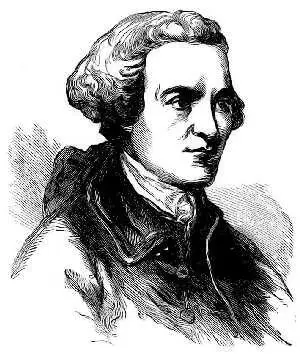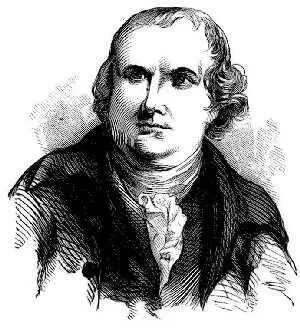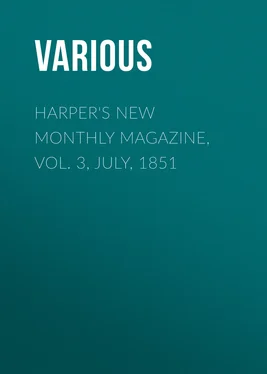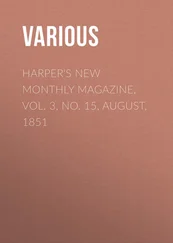Various - Harper's New Monthly Magazine, Vol. 3, July, 1851
Здесь есть возможность читать онлайн «Various - Harper's New Monthly Magazine, Vol. 3, July, 1851» — ознакомительный отрывок электронной книги совершенно бесплатно, а после прочтения отрывка купить полную версию. В некоторых случаях можно слушать аудио, скачать через торрент в формате fb2 и присутствует краткое содержание. Издательство: Иностранный паблик, Жанр: foreign_antique, periodic, foreign_edu, на английском языке. Описание произведения, (предисловие) а так же отзывы посетителей доступны на портале библиотеки ЛибКат.
- Название:Harper's New Monthly Magazine, Vol. 3, July, 1851
- Автор:
- Издательство:Иностранный паблик
- Жанр:
- Год:неизвестен
- ISBN:нет данных
- Рейтинг книги:3 / 5. Голосов: 1
-
Избранное:Добавить в избранное
- Отзывы:
-
Ваша оценка:
- 60
- 1
- 2
- 3
- 4
- 5
Harper's New Monthly Magazine, Vol. 3, July, 1851: краткое содержание, описание и аннотация
Предлагаем к чтению аннотацию, описание, краткое содержание или предисловие (зависит от того, что написал сам автор книги «Harper's New Monthly Magazine, Vol. 3, July, 1851»). Если вы не нашли необходимую информацию о книге — напишите в комментариях, мы постараемся отыскать её.
Harper's New Monthly Magazine, Vol. 3, July, 1851 — читать онлайн ознакомительный отрывок
Ниже представлен текст книги, разбитый по страницам. Система сохранения места последней прочитанной страницы, позволяет с удобством читать онлайн бесплатно книгу «Harper's New Monthly Magazine, Vol. 3, July, 1851», без необходимости каждый раз заново искать на чём Вы остановились. Поставьте закладку, и сможете в любой момент перейти на страницу, на которой закончили чтение.
Интервал:
Закладка:
"Common Sense" was printed and scattered by thousands over the land. In the army it was read by the captains at the head of their companies, and at public gatherings its strong but just language was greeted with loud acclaim. Neighbor read it to neighbor, and within three months after its appearance a desire for absolute independence of Great Britain glowed in almost every patriot bosom, and found expression at public meetings, in the pulpit, and in social circles.
The Colonial Assemblies soon began to move in the matter. North Carolina was the first to take the bold, progressive step toward independence. By a vote of a convention held on the 22d of April, 1776, the representatives of that State in the Continental Congress were authorized "to concur with those in the other colonies, in declaring independence." Eleven months earlier than this, a meeting at Charlotte, in Mecklenburg County, forswore allegiance to the British crown.
On the 10th of April, the General Assembly of Massachusetts requested the people of that colony, at the approaching election of new representatives, to give them instructions on the subject of independence. Pursuant to this request, the people of Boston, in town meeting assembled on the 23d, instructed their representatives to use their best endeavors to have their delegates at Philadelphia "advised, that in case Congress should think it necessary for the safety of the united colonies, to declare themselves independent of Great Britain, the inhabitants of that colony, with their lives and the remnants of their fortunes, would most cheerfully support them in the measure."
The Convention of Virginia passed a similar resolution on the 17th of May, and then proceeded to the establishment of a regular independent government for the colony. In its instructions the Virginia Convention directed its representatives to propose a declaration of independence. The General Assembly of Rhode Island adopted a similar resolution the same month, and also directed the usual oath of allegiance, thereafter, to be given to the State of Rhode Island, instead of to the King of Great Britain.
On the 8th of June the New York delegates in Congress asked for special instructions on the subject, but the Provincial Assembly, deeming itself incompetent to instruct in so grave a matter without the previous sanction of the people, merely recommended the inhabitants to signify their sentiments at the election just at hand. The New York delegates were never instructed on the subject, and those who signed the Declaration did so upon their own responsibility. But when a copy of the Declaration reached the Provincial Assembly of New York, then in session at White Plains, that body passed a resolution of approval, and directed their delegates to act in future, as the public good might require.
The Assembly of Connecticut, on the 14th of June, instructed their delegates "to give the assent of the colony to such Declaration, when they should judge it expedient." On the 15th the New Hampshire Provincial Congress issued similar instructions; and on the 21st the new delegates from New Jersey were directed to act in the matter according to the dictates of their own judgments.
THE STATE HOUSE, OR INDEPENDENCE HALL, AS IT APPEARED IN 1776.
In the Pennsylvania Assembly, several months previously, the subject of independence had been hinted at. The Conservatives were alarmed, and procured the adoption of instructions to their delegates, adverse to such a measure. In June these restrictions were removed, and they were neither instructed nor officially permitted to concur with the other colonies in a declaration of independence. But a convention of the people, held in Philadelphia on the 24th of June, expressed their willingness and desire to act in concert with those of the other colonies, and requested the representatives of that province to vote affirmatively.
The Convention of Maryland, by a resolution adopted at about the close of May, positively forbade their delegates voting for independence; but through the influence of Carroll, Chase, Paca, and others, the prohibition was recalled on the 28th of June, and they were empowered to give a vote for Maryland concurrent with the other provinces. Delaware, South Carolina, and Georgia refrained from action on the subject, except such as occurred at small district meetings, and their delegates were left free to vote as they pleased. So rapid was the change in public opinion after the British troops were driven out of Boston, that within the space of sixty-five days, the representatives of ten of the thirteen colonies were specially instructed by their constituents to sever the political tie which bound them to Great Britain.
The Continental Congress, now in permanent session, was assembled in the State House in Philadelphia, a spacious building yet standing—a relic of rarest interest to the American, because of the glorious associations which hallow it.
"This is the sacred fane wherein assembled
The fearless champions on the side of Right;
Men at whose Declaration empires trembled,
Moved by the Truth's clear and eternal light.
"This is the hallowed spot where first, unfurling,
Fair Freedom spread her blazing scroll of light;
Here, from Oppression's throne the tyrant hurling,
She stood supreme in majesty and might."

JOHN HANCOCK.

ROBERT MORRIS.
Stimulated by affirmative action in the various colonies, the desire for independence became a living principle in the hall of the Continental Congress, and that principle found utterance, albeit with timorous voice. John Hancock, an opulent merchant of Boston, and from the commencement of difficulties in 1765, a bold, uncompromising, zealous, and self-sacrificing patriot, was seated in the presidential chair, to which he had been called a year previously, when Peyton Randolph, the first incumbent, was summoned to the bedside of his dying wife in Virginia. The equally bold and uncompromising Adamses were his colleagues, from Massachusetts Bay. On his right sat Franklin of Pennsylvania, Sherman of Connecticut, Rutledge of South Carolina, and young Jefferson of Virginia. On his left was the eloquent Dickenson of Pennsylvania, and his colleague, Robert Morris, the financier of the Revolution, whose capital and credit, controlled by untiring energy and love of country, sustained the cause of freedom in the darkest hours of its struggles with tyranny. Near him was the lovely and refined Arthur Middleton of South Carolina, with a heart full of philanthropy, and a mind at ease while he saw his immense fortune melting away before the fire of revolution. In front was Richard Henry Lee, the Cicero of that august assembly, and by his side sat the venerable John Witherspoon of Princeton College, the equally impressive and earnest preacher of the gospel of Christ and the gospel of civil liberty. Near the President's chair sat the attenuated, white-haired secretary, Charles Thomson, who for fifteen years held the pen of the old Congress, and arranged, with masterly hand, its daily business. On every side were men, less conspicuous but equally zealous, bearing upon their shoulders a responsibility unparalleled in the history of the world in importance, whether considered in the aspect of immediate effects or prospective results.
On the 10th of May, the initial step toward independence was taken by Congress, when it was resolved, "that it be recommended to the several assemblies and conventions of the United Colonies, where no government, sufficient to the exigencies of their affairs, hath hitherto been established, to adopt such a government as shall, in the opinions of the representatives of the people, best conduce to the happiness and safety of their constituents in particular, and America in general." A preamble to this resolution was prepared by a committee, consisting of John Adams, Edward Rutledge, and Richard Henry Lee, in which the principles of independent sovereignty were clearly set forth. It was declared "irreconcilable to reason and a good conscience for the colonists to take the oaths required for the support of the government under the crown of Great Britain." It was also declared necessary, that all royal rule should be suppressed, and all "the powers of government exerted under the authority of the people of the colonies, for the preservation of internal peace, virtue, and good order, as well as for the defense of their lives, liberties, and properties, against the hostile invasions, and civil depredations of their enemies." This language was certainly very bold, but not sufficiently positive and comprehensive, as a basis of energetic action, in favor of independence. The hearts of a majority in Congress now yearned with an irrepressible zeal for the consummation of an event which they knew to be inevitable; yet there seemed to be no one courageous enough in that assembly to step forth and take the momentous responsibility of lifting the knife that should dismember the British Empire. The royal government would mark that man as an arch-rebel, and all its energies would be brought to bear to quench his spirit, or to hang him on a gibbet. 1 1 At that time a son of Mr. Lee was at school at St. Bees, in England. One day, as he was standing near one of the professors of the academy, who was conversing with a gentleman of the neighboring country, he heard the question asked, "What boy is this?" To which the professor replied, "He is the son of Richard Henry Lee, of America." The gentleman, upon hearing this, put his hand upon the boy's head, and remarked, "We shall yet see your father's head upon Tower Hill." The boy promptly answered, "You may have it when you can get it." That boy was the late Ludwell Lee, Esq., of Virginia.
Интервал:
Закладка:
Похожие книги на «Harper's New Monthly Magazine, Vol. 3, July, 1851»
Представляем Вашему вниманию похожие книги на «Harper's New Monthly Magazine, Vol. 3, July, 1851» списком для выбора. Мы отобрали схожую по названию и смыслу литературу в надежде предоставить читателям больше вариантов отыскать новые, интересные, ещё непрочитанные произведения.
Обсуждение, отзывы о книге «Harper's New Monthly Magazine, Vol. 3, July, 1851» и просто собственные мнения читателей. Оставьте ваши комментарии, напишите, что Вы думаете о произведении, его смысле или главных героях. Укажите что конкретно понравилось, а что нет, и почему Вы так считаете.












